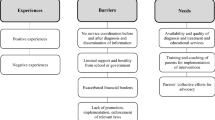Abstract
The increased recognition and reported prevalence of autism spectrum disorders (ASD) combined with the associated societal and clinical impact call for a broad grassroots community-based dialogue on treatment related ethical and social issues. In these Stony Brook Guidelines, which were developed during a full year of community dialogue (2010–2011) with affected individuals, families, and professionals in the field, we identify and discuss topics of paramount concern to the ASD constituency: treatment goals and happiness, distributive justice, managing the desperate hopes for a cure, sibling responsibilities, intimacy and sex, diagnostic ethics, and research ethics. The members of the dialogue core committee included doctors, ethicists, administrators, social workers, ministers, disability experts, and many family members of individuals with autism who were especially engaged in community activities on behalf of their constituency, including siblings, parents, and grandparents. Our guidelines are not based on “top-down” imposition of professional expertise, but rather on a “bottom-up” grass roots attention to the voices of affected individuals and families speaking from experience. These guidelines can inform clinical practice, but they also are meaningful for the wider social conversation emerging over the treatment of individuals with ASD.
Similar content being viewed by others
References
Alzheimer’s Association (US). Ethical issues in Alzheimer’s disease. Chicago: Alzheimer’s Association US, 2001, 2011 revised.
Alzheimer Society of Canada. (1997). Tough issues: Ethical guidelines of the Alzheimer Society of Canada. Toronto: Alzheimer Canada Imprint.
Goddard, L., Howlin, P., Dritschel, B., & Patel, T. (2007). Autobiographical memory and social problem solving in Asperger syndrome. Journal of Autism and Developmental Disorders, 37, 291–300.
Habermas, J. (1993). Justification and application: Remarks on discourse ethics. Cambridge, MA: MIT Press.
Lara, J. (2015). Autism movement therapy method: Waking up the brain! Philadelphia: Jessica Kingsley Publishers.
Moody, H. R. (1992). A critical review of ethical issues in dementia. In R. H. Binstock, S. G. Post, & P. J. Whitehouse (Eds.), Dementia and aging: Ethics, values and policy choices (pp. 86–100). Baltimore: The Johns Hopkins University Press.
Post, S. G. (2000). The moral challenge of Alzheimer disease: Ethical issues from diagnosis to dying (2nd ed.). Baltimore: The Johns Hopkins University Press.
Post, S. G., & Whitehouse, P. J. (1995). The Fairhill guidelines on ethics of the care of people with Alzheimer’s disease: A clinical summary. Journal of the American Geriatrics Society, 43, 1423–1429.
Representative Background Clinical Guidelines
Committee on Children with Disabilities. (2001). American academy of pediatrics: Counseling families who choose complementary and alternative medicine for their child with chronic illness or disability. Committee on Children with Disabilities. Pediatrics, 107(3), 598–601.
New Zealand Ministry of Health (2008). Diagnosis and initial assessment of ASD. In Ministries of Health and Education. New Zealand autism spectrum disorder guideline. (pp. 33–60). Wellington: New Zealand Ministry of Health.
Filipek, P. A., Accardo, P. J., Ashwal, S., Baranek, G. T., Cook, E. H., Jr., Dawson, G., et al. (2000). Practice parameter: Screening and diagnosis of autism: Report of the quality standards subcommittee of the American Academy of Neurology and the Child Neurology Society. Neurology, 55(4), 468–479.
Johnson, C. P., Myers, S. M., & American Academy of Pediatrics Council on Children With Disabilities. (2007). Identification and evaluation of children with autism spectrum disorders. Pediatrics, 120(5), 1183–1215.
Myers, S. M., Johnson, C. P., & American Academy of Pediatrics Council on Children With Disabilities. (2007). Management of children with autism spectrum disorders. Pediatrics, 120(5), 1162–1182.
Scottish Intercollegiate Guidelines Network (SIGN)(2007). Assessment, diagnosis and clinical interventions for children and young people with autism spectrum disorders. A national clinical guideline. Edinburgh (Scotland): Scottish Intercollegiate Guidelines Network (SIGN); (SIGN publication; no. 98).
Volkmar, F., Cook, E. H., Jr., Pomeroy, J., Realmuto, G., & Tanguay, P. (1999). Practice parameters for the assessment and treatment of children, adolescents, and adults with autism and other pervasive developmental disorders. American Academy of Child and Adolescent Psychiatry Working Group on Quality Issues. Journal of the American Academy of Child & Adolescent Psychiatry, 38(12 Suppl), 32S–54S.
Acknowledgements
Pamela Block, PhD; Louis and Florence Boroson (This paper is dedicated to the memory of Louis Boroson and Florence Boroson who both passed within six months of the completion of the dialogue series); Anne Coulehan, MSW ACSW CPE NACC, Chaplain, Stony Brook University Medical Center; Jack Coulehan, PhD MPH, Senior Fellow, Center for Medical Humanities, Compassionate Care, and Bioethics, Stony Brook University; Kim Covell, Editor with the Press News Group, and Co-Founder of AweinAutism.com; Kim Kubasek, Associate Executive Director, Developmental Disabilities Institute; Elizabeth Luchsinger, MS; Shana Nichols, PhD, Clinical Psychologist and Director of ASPIRE Center for Learning and Development; James Parles, MD, Smithtown Pediatrics; Linda Scheiber, PhD, Director of Clinical Services, Maryhaven Center for Hope; Samara Tetenbaum, PhD, Psychology Postdoctoral Fellow, Co-Director of ASPIRE Center for Learning and Development; Rose Ann Walsh, Autism Speaks.
Author information
Authors and Affiliations
Corresponding author
Additional information
The Committee members are listed in Acknowledgement section.
Rights and permissions
About this article
Cite this article
Post, S.G., Pomeroy, J., Keirns, C. et al. A Grassroots Community Dialogue on the Ethics of the Care of People with Autism and Their Families: The Stony Brook Guidelines. HEC Forum 29, 93–126 (2017). https://doi.org/10.1007/s10730-017-9320-9
Published:
Issue Date:
DOI: https://doi.org/10.1007/s10730-017-9320-9




